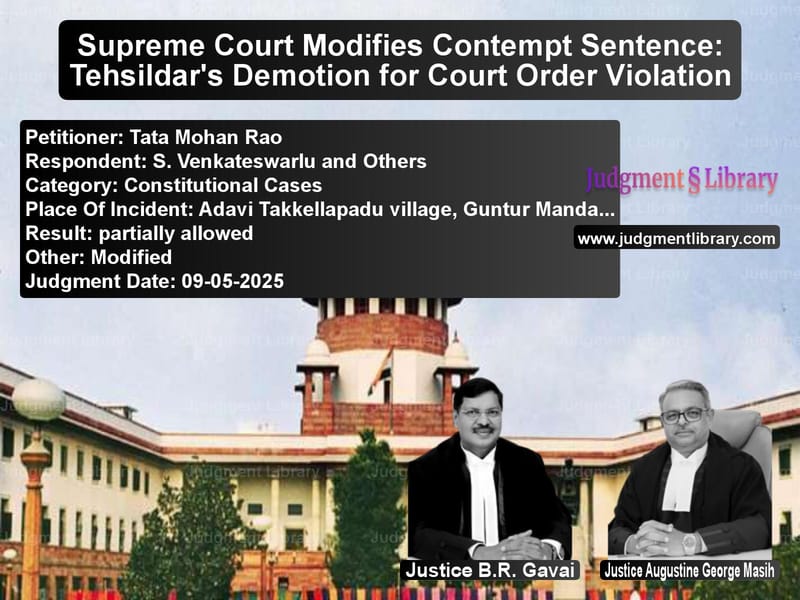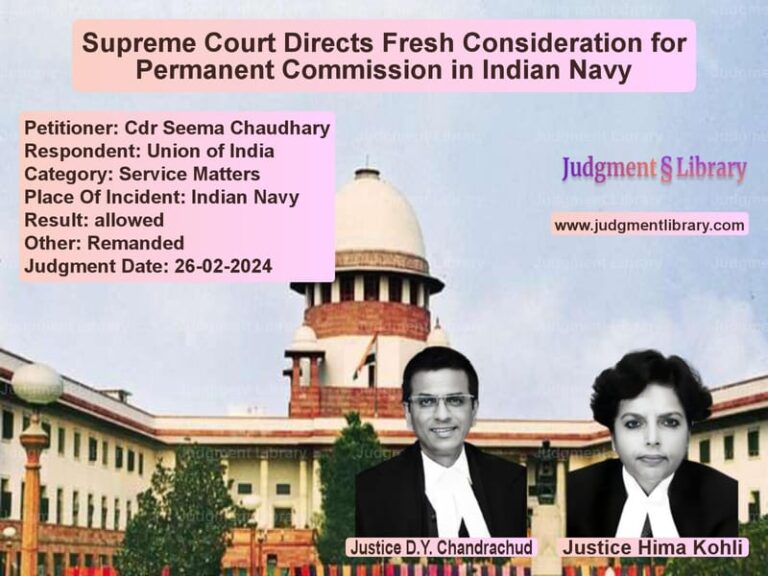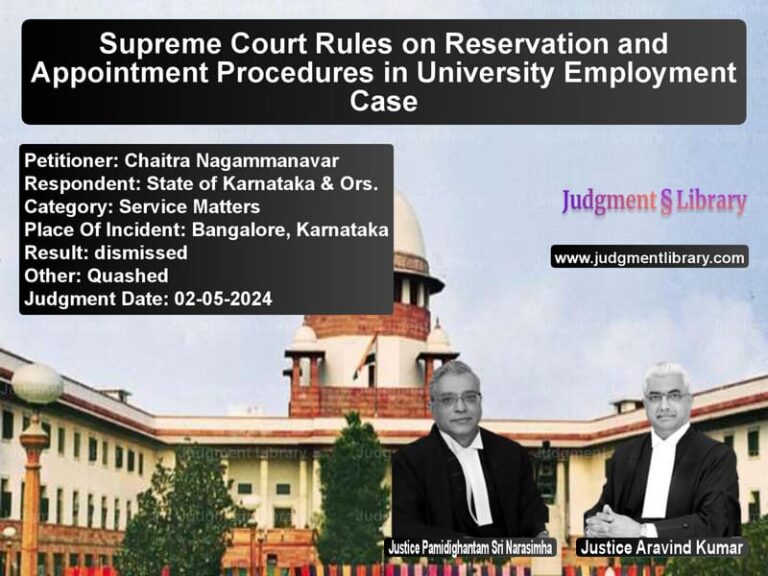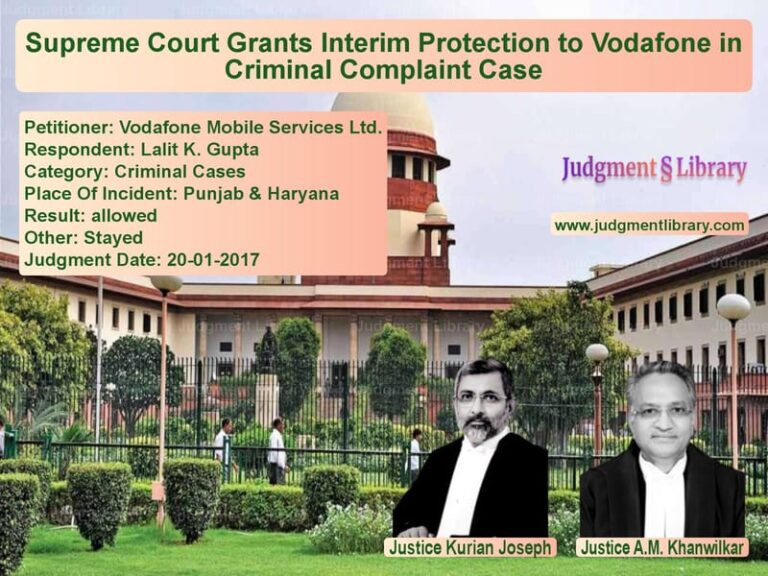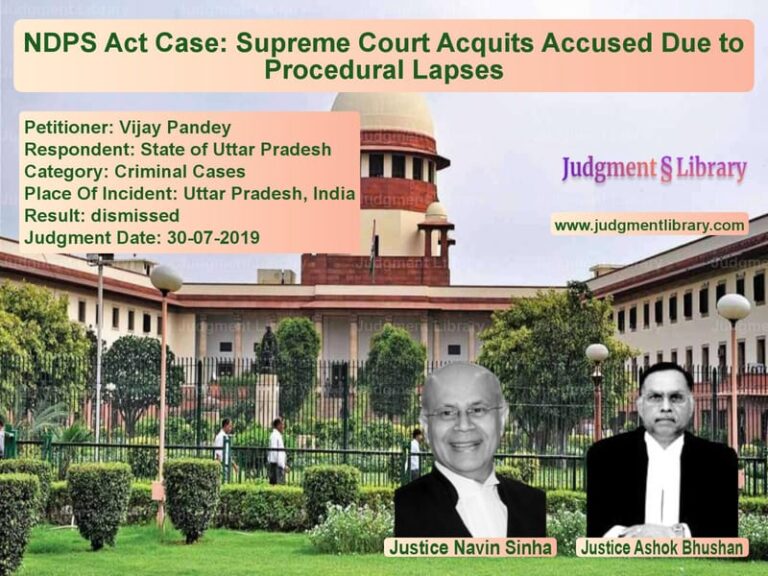Supreme Court Modifies Contempt Sentence: Tehsildar’s Demotion for Court Order Violation
In a significant judgment that balances the need to uphold judicial authority with humanitarian considerations, the Supreme Court recently modified the punishment of a government official convicted for contempt of court. The case involved Tata Mohan Rao, a Tehsildar who had been sentenced to two months imprisonment by the Andhra Pradesh High Court for willfully disobeying court orders protecting the rights of citizens occupying government land. The Supreme Court, while strongly condemning the official’s actions, took a nuanced approach to sentencing that considered the impact on his family while ensuring that the message of judicial authority remained clear and uncompromised.
The legal saga began when several citizens, including S. Venkateswarlu and others, claimed possession of land situated in Adavi Takkellapadu village near Summer Peta, Guntur Mandal. These individuals had constructed houses on the land and filed representations before revenue authorities seeking house site pattas to regularize their constructions. When their representations went unaddressed and they faced threats of eviction, they approached the High Court through writ petitions.
The Court Orders and Their Violation
The High Court, in its order dated September 13, 2013, directed the Tehsildar to consider the representations of the citizens and communicate a decision within two months. Crucially, the court explicitly ordered that until a decision was made, no authorities should disturb the possession of the respondents residing on the subject land. This protective order was meant to ensure that due process was followed and that citizens were not arbitrarily evicted without proper consideration of their claims.
Despite this clear judicial directive, Tata Mohan Rao, who was then serving as Tehsildar, proceeded to remove certain structures from the subject land. When this matter came before the High Court in December 2013, Rao defended his actions by claiming that unauthorized structures had been erected overnight and that as a government servant duty-bound to protect government land, he was merely discharging his responsibilities.
The High Court, in its order dated December 11, 2013, specifically rejected Rao’s contention, recording that “such conduct on part of a public servant does not auger well in a democratic society governed by the rule of law.” The court observed that “respondent no.3 therein (appellant herein) could not have taken law into his own hands by forcibly removing structures from the subject land” and specifically restrained Rao from acting in such manner.
What followed demonstrated a shocking disregard for judicial authority. Despite the September 2013 order and the specific warning issued on December 11, 2013, Rao, on the very next night of December 12, 2013, accompanied by a police force of 80 personnel, threw the occupants from their homes, removed their belongings, and allegedly beat women and children mercilessly. This brazen violation of explicit court orders led to the filing of contempt petitions against Rao.
The High Court’s Ruling
The Single Judge of the High Court, in a common judgment dated March 27, 2015, held Rao guilty of deliberately and willfully disobeying court orders. The court found that despite a specific warning, Rao had indulged in demolishing huts and evicting occupants. The High Court characterized Rao’s conduct as “intolerable” and refused to take a lenient view. Consequently, the court convicted Rao under the Contempt of Courts Act, 1971, and sentenced him to two months of simple imprisonment along with a fine of Rs. 2,000.
Rao appealed this decision before the Division Bench of the High Court, which dismissed his appeals through a common final judgment dated February 19, 2025. The Division Bench reiterated that despite clear court orders and specific warnings, Rao had repeated his misconduct. The bench confirmed the Single Judge’s order deprecating Rao’s actions and the finding that he deserved no mercy.
Arguments Before the Supreme Court
Before the Supreme Court, Senior Counsel Shri Devashish Bharuka, representing appellant Rao, made several arguments seeking leniency. He contended that “during those days, the situation in the border areas arising from the bifurcation of Andhra Pradesh and Telangana was precarious” and that “the appellant made an effort in a bona fide manner to safeguard the government land.” Bharuka further submitted that “the appellant had only evicted the persons who had constructed the houses overnight.”
The counsel raised significant concerns about the consequences of imprisonment, arguing that “if the appellant is imprisoned for a period of 48 hours, then under the relevant service rules, he would be liable to be dismissed from service.” He emphasized the humanitarian aspects, stating that “the appellant and his entire family would be rendered homeless” and that “the appellant’s two children, currently studying in 11th and 12th standard, would not be in a position to continue their education and that their careers would also be adversely affected.”
Notably, despite being duly served, no one appeared on behalf of the respondents, leaving the court to consider the matter primarily based on the appellant’s submissions and the record of the case.
The Supreme Court’s Stern Observations
The Supreme Court bench comprising Justices B.R. Gavai and Augustine George Masih began its analysis with strong criticism of Rao’s actions. The court observed that “the appellant ought to have considered the consequences before demolishing the structures of the home dwellers and throwing them on the road along with their belongings and that too despite of the specific warnings given to him by the High Court in its order dated 11th December 2013.”
In some of the strongest language seen in recent contempt cases, the court characterized Rao’s actions as “inhumane,” noting that “if the appellant expects this Court to take a humanitarian approach, such conduct was not expected from him.” The court referenced the High Court’s finding that apart from violating specific court orders, “there was a total lack of humanitarian consideration in the appellant’s action.”
The Supreme Court acknowledged that it “could have taken a serious view of the matter” given the egregious nature of the contempt. However, the court introduced a philosophical dimension to its reasoning, stating that “we are reminded of a well-established principle that the majesty of law lies not in punishing, but in forgiving.”
Balancing Justice and Mercy
The court engaged in a delicate balancing act between upholding judicial authority and considering humanitarian factors. While unequivocally stating that “the appellant does not merit any leniency on account of his adamant and callous conduct,” the court nevertheless found that “his children and family should not suffer as a consequence of his actions.”
The practical consequence of the original sentence weighed heavily in the court’s consideration. The judges noted that “if the appellant undergoes the original sentence of two months, under the relevant service rules, he would be immediately dismissed from his service thereby depriving his children and family of their livelihood.”
This consideration led the court to confirm Rao’s conviction but modify the sentence. The court emphasized that while taking a lenient view, “it is necessary for this Court to send a clear message that no one, howsoever high they may be, they are not above the law.”
The Supreme Court’s Final Ruling
In its final order, the Supreme Court laid down important principles about obedience to judicial orders, stating that “when a Constitutional Court or for that matter, any court issues any direction, every person or authority regardless of rank, is duty bound to respect and comply with that order.” The court emphasized that “disobedience of the orders passed by the court attacks the very foundation of the rule of law on which the edifice of a democracy is based.”
The court concluded that “the ends of justice would be subserved if the conviction of the appellant is affirmed, however, the sentence of imprisonment imposed on him by the High Court is modified.” The bench found that “in order to send across the right message, the conviction under the Contempt of Courts Act 1971 be confirmed, however, insofar as the sentence is concerned, the appellant shall suffer a reduction of one level in rank in the hierarchy of his service and shall also be liable to pay a heavy fine.”
The court specifically noted that Rao had been promoted as Deputy Collector on October 31, 2023. In its final order, the Supreme Court partly allowed the appeals with the following modifications: Rao’s conviction under the Contempt of Courts Act was confirmed; the State of Andhra Pradesh was directed to revert Rao to the post of Tehsildar with his seniority for promotional purposes considered only from October 31, 2023; and Rao was directed to pay a substantial fine of Rs. 1,00,000 to be deposited under the NTR Housing Scheme within four weeks.
Broader Implications of the Judgment
This judgment represents a significant development in contempt jurisprudence in India. While the Supreme Court has previously emphasized the importance of obeying court orders, this case demonstrates the court’s willingness to consider creative sentencing options that serve both the need to uphold judicial authority and address humanitarian concerns.
The decision sends a clear message to government officials about the seriousness with which courts view violations of judicial orders. The substantial professional setback of being reverted from Deputy Collector to Tehsildar, coupled with the significant financial penalty, serves as a meaningful deterrent while avoiding the catastrophic consequences that imprisonment and consequent dismissal would have visited upon Rao’s family.
The judgment also underscores the court’s role as not just a dispenser of legal justice but as an institution that considers the broader human impact of its decisions. The recognition that innocent family members should not bear the full brunt of a public official’s misconduct reflects a mature and compassionate approach to justice.
However, the court was careful to balance this compassion with a firm reaffirmation of judicial authority. The strong language used to condemn Rao’s actions, the confirmation of his conviction, and the imposition of significant professional and financial penalties ensure that the fundamental principle—that court orders must be obeyed—remains uncompromised.
This case serves as an important precedent for future contempt cases, particularly those involving public officials. It demonstrates that while courts may show mercy in sentencing, they will not tolerate willful disobedience of judicial orders, especially when such disobedience involves the rights of vulnerable citizens. The judgment reinforces that in a democracy governed by the rule of law, every authority, regardless of position, is accountable to the judiciary and must respect its directives.
Petitioner Name: Tata Mohan Rao.Respondent Name: S. Venkateswarlu and Others.Judgment By: Justice B.R. Gavai, Justice Augustine George Masih.Place Of Incident: Adavi Takkellapadu village, Guntur Mandal, Andhra Pradesh.Judgment Date: 09-05-2025.Result: partially allowed.
Don’t miss out on the full details! Download the complete judgment in PDF format below and gain valuable insights instantly!
Download Judgment: tata-mohan-rao-vs-s.-venkateswarlu-and-supreme-court-of-india-judgment-dated-09-05-2025.pdf
Directly Download Judgment: Directly download this Judgment
See all petitions in Contempt Of Court cases
See all petitions in Fundamental Rights
See all petitions in Public Sector Employees
See all petitions in Disciplinary Proceedings
See all petitions in Legal Malpractice
See all petitions in Judgment by B R Gavai
See all petitions in Judgment by Augustine George Masih
See all petitions in partially allowed
See all petitions in Modified
See all petitions in supreme court of India judgments May 2025
See all petitions in 2025 judgments
See all posts in Constitutional Cases Category
See all allowed petitions in Constitutional Cases Category
See all Dismissed petitions in Constitutional Cases Category
See all partially allowed petitions in Constitutional Cases Category

